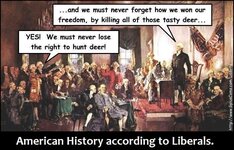- Messages
- 4,807
- Reactions
- 5,097
Being a student of firearms, I take regulated to mean a fire arms sights have been aligned with the barrel to a specific point of aim corresponding with the point of impact. It is a term applied to more recently to double rifles and shotguns, but could be applied to single barrel rifles and shotguns as well. Given the language and usage of the time "militia" was a term applied to THINGS of a military nature. What we think of as militia were actually termed volunteers at that time.
Just putting this out there to either be supported, debunked or expanded upon
Just putting this out there to either be supported, debunked or expanded upon













